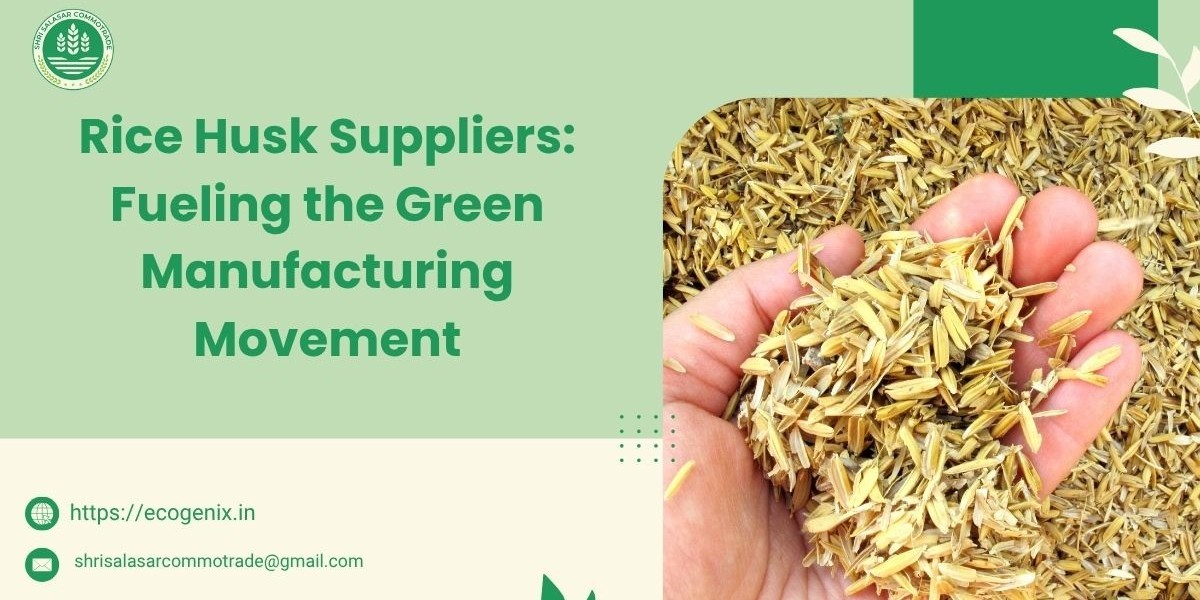Introduction
As industries worldwide shift toward sustainability, the role of eco-friendly materials in manufacturing has never been more important. One such material gaining widespread attention is rice husk, the hard protective covering of rice grains discarded during milling. What was once an agricultural waste product is now emerging as a valuable resource across multiple sectors.
Behind this transition stands a new generation of rice husk suppliers, the vital link between rice mills and industries seeking greener alternatives. These suppliers are not just trading raw materials; they are powering the green manufacturing revolution. In this article, we’ll explore the role of rice husk suppliers, their impact on sustainable production, the industries they serve, and how this natural by-product is shaping the future of responsible manufacturing.
What is Rice Husk?
Rice husk, also called rice hull, is the outer shell of a rice grain removed during the milling process. For every ton of rice, about 200 kg of husk is produced. With global rice production in the hundreds of millions of tons, rice husk is available in vast quantities.
In the past, rice husk was often burned or dumped in landfills. Today, it is valued for its properties such as:
High silica content
Lightweight and biodegradable
High energy value (used as biomass fuel)
Affordable and easy to process
These qualities make it suitable for everything from power generation to the production of eco-friendly bricks and bioplastics.
Who Are Rice Husk Suppliers?
Rice husk suppliers collect, store, process (if needed), and distribute rice husk to various industries. They work with rice mills and manufacturers, ensuring a reliable supply of this natural by-product. Some suppliers focus only on local industries, while others serve national or even international clients.
These suppliers are becoming increasingly important as more businesses look for low-cost, sustainable materials to meet environmental goals and reduce dependence on fossil fuels.
How Rice Husk Suppliers Are Driving Green Manufacturing
Rice husk suppliers play a key role in transforming how industries manufacture their products. Here's how:
Supplying Biomass Fuel
Rice husk has a high calorific value, making it a great source of bioenergy. Power plants and factories burn it in boilers to produce steam or electricity. Suppliers provide properly dried and processed husk in bulk, ensuring a steady fuel source.
Supporting Eco-Conscious Building Materials
In construction, rice husk ash is used to make eco-friendly bricks, concrete, and insulation. Suppliers deliver raw husk or processed ash to green building product manufacturers.
Reducing Waste
Suppliers help reduce agricultural waste by collecting husk that would otherwise be burned or dumped. This supports a circular economy and promotes sustainable development.
Enabling Silica Recovery
Rice husk ash contains more than 90% silica, a valuable material for industries like glass, ceramics, and electronics. Suppliers are essential in delivering husk to companies that extract and refine this silica.
A Day in the Life of a Rice Husk Supplier
Imagine a small company that sources husk from 10 local rice mills. Here's how they operate:
Morning: Trucks are loaded with freshly milled rice husk.
Midday: The husk is weighed, checked for moisture, and stored in dry silos.
Afternoon: Orders from factories are packed and shipped.
Evening: The team checks inventory, coordinates with clients, and plans next-day deliveries.
This process runs every day, ensuring timely supply for businesses relying on rice husk to meet their eco goals.
Why the Demand for Rice Husk is Growing
Environmental Policies: Governments around the world are pushing for greener manufacturing. Using rice husk helps industries meet these standards.
Cost-Effectiveness: Rice husk is cheaper than traditional fuels and raw materials like coal, cement, and plastic.
Versatility: Rice husk can be burned, molded, mixed, or composted. It’s a multi-use material with growing applications.
Carbon Credit Opportunities: Industries using rice husk instead of fossil fuels can earn carbon credits, giving suppliers an edge in the market.
The Future of Rice Husk Supply Chain
The future looks promising for rice husk suppliers as innovation and sustainability continue to drive market demand.
Rice Husk Pellets
Turning husk into dense pellets makes it easier to store and transport. This form is popular in global biofuel markets.
Export Opportunities
Countries like Japan, Germany, and the UK are buying rice husk for biomass energy. Suppliers can tap into these markets with proper packaging and certifications.
Partnerships with Startups
Startups are creating eco-products like biodegradable tableware, cups, and packaging from rice husk. Suppliers are partnering with them to supply raw materials.
Digital Marketplaces
Platforms like IndiaMART and Alibaba have made it easier for rice husk suppliers to reach buyers globally.
How to Become a Successful Rice Husk Supplier
If you’re considering entering this growing market, here are a few steps to get started:
Find Reliable Sources: Partner with rice mills and farmers to get husk in bulk.
Set Up Storage: Build covered and dry storage to keep husk in good condition.
Identify Buyers: Contact factories, biofuel plants, and construction material makers.
Handle Transportation: Arrange trucks or tie up with logistic partners for timely delivery.
Stay Compliant: Follow environmental regulations and get the necessary business licenses.
Note:- Purchase affordable rice husk ash in India
Conclusion
The rise of rice husk suppliers is a powerful example of how sustainability and business can go hand in hand. By turning agricultural waste into valuable raw material, these suppliers are reducing pollution, saving resources, and helping industries go green.
As more companies aim to lower their environmental impact, the demand for eco-friendly and affordable materials like rice husk will continue to grow. This puts rice husk suppliers in a strong position to not only thrive in business but also make a lasting positive impact on the planet.
So, whether you're a manufacturer, entrepreneur, or someone looking for a green business opportunity — remember that the future of sustainable manufacturing might just lie in a handful of husk.








